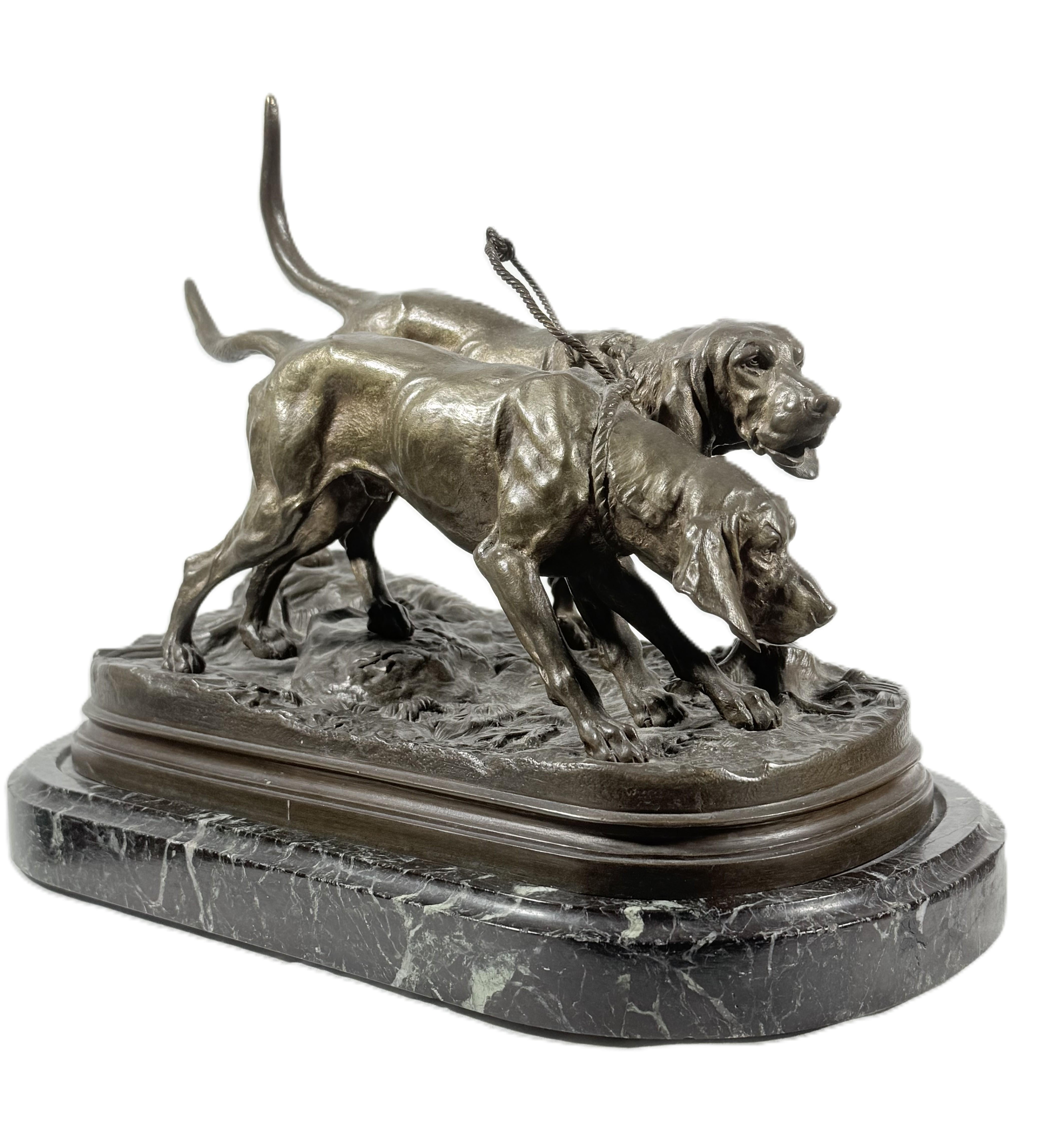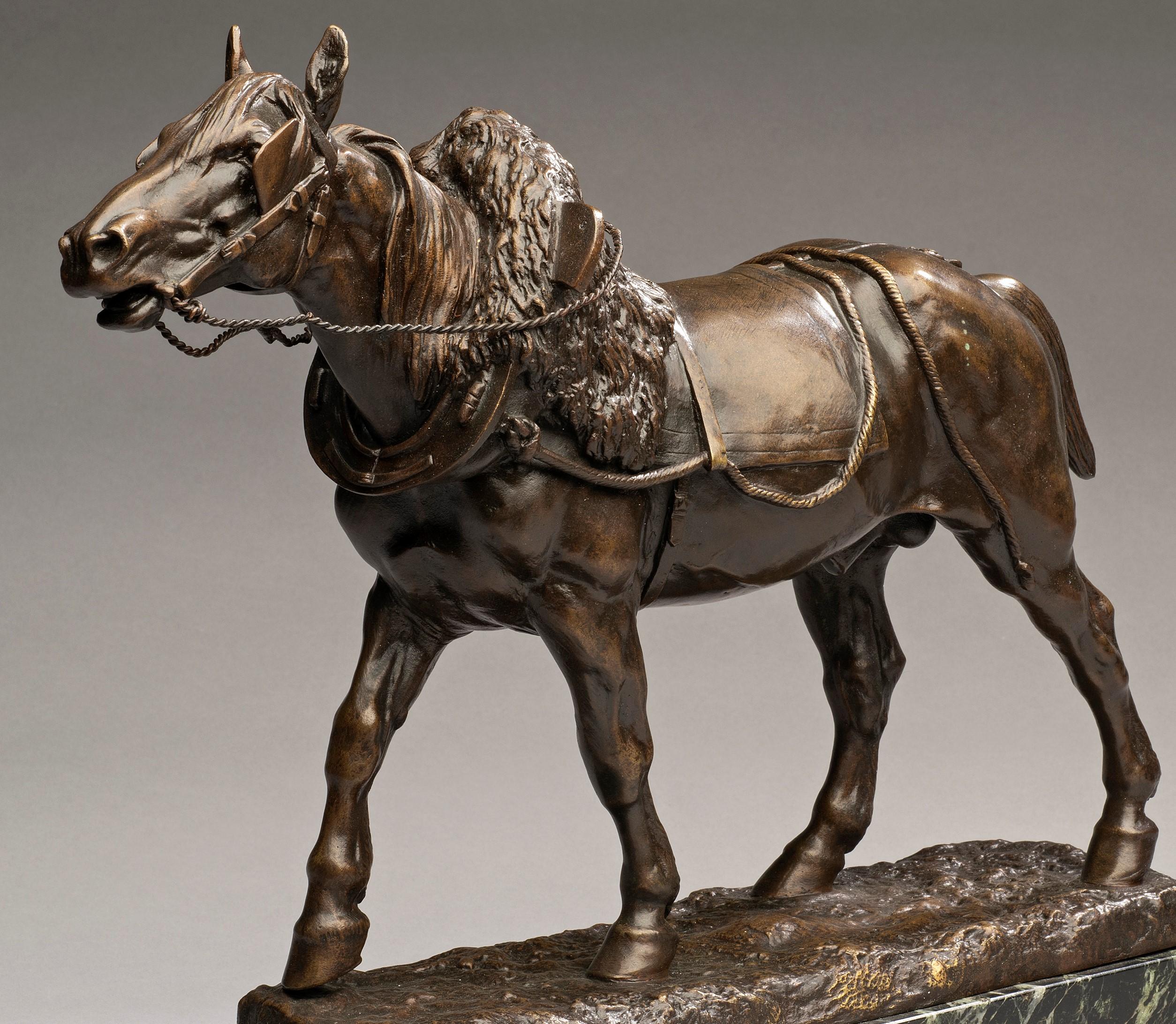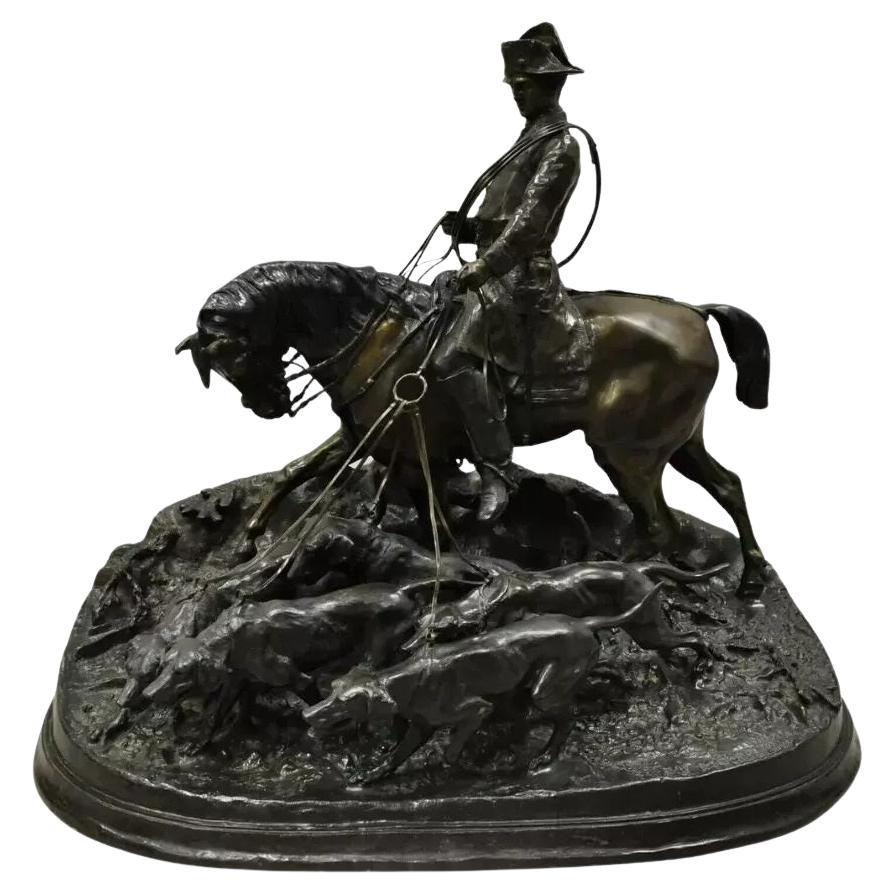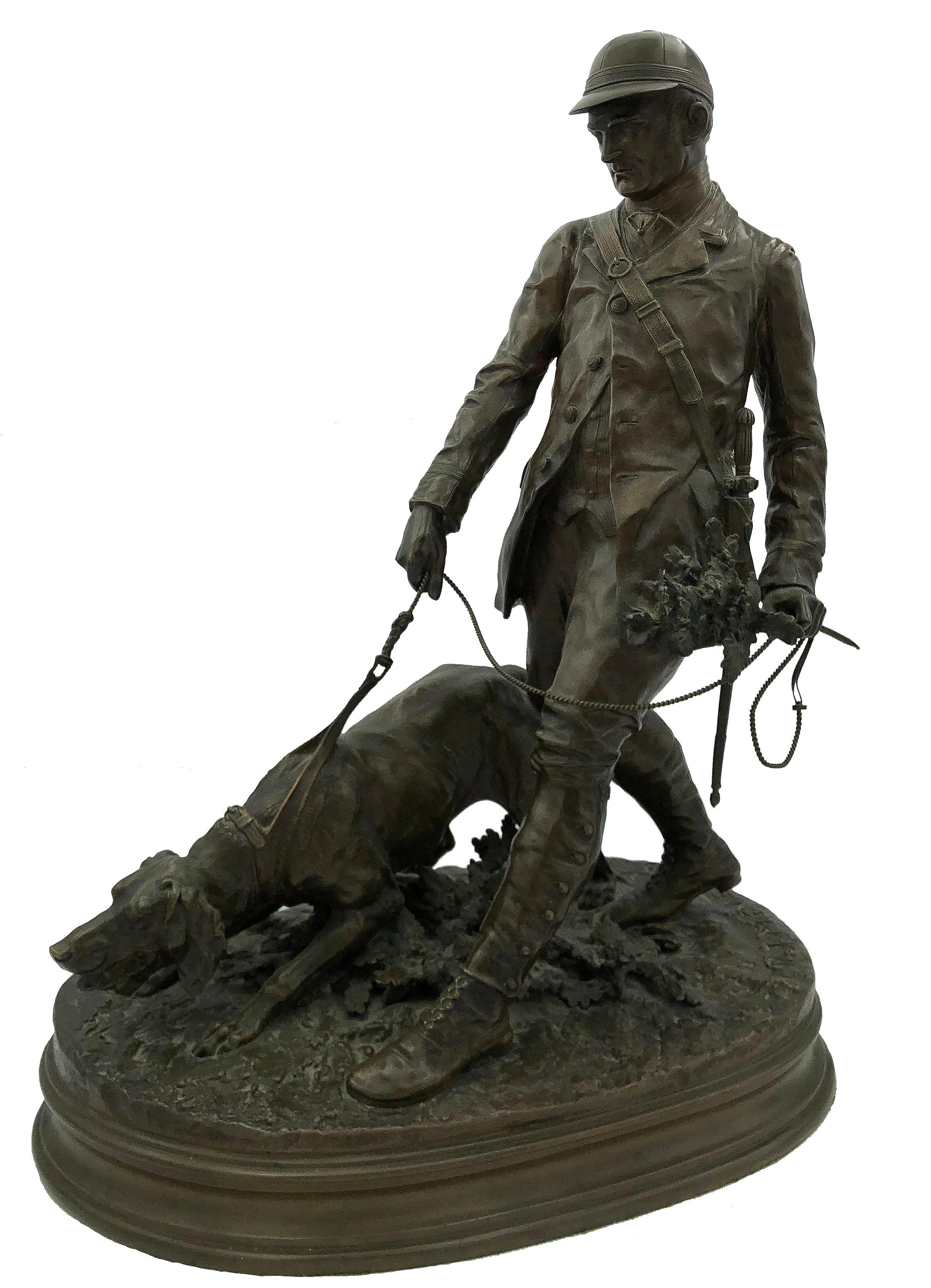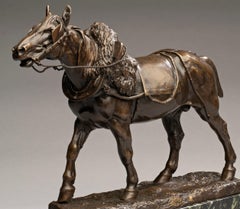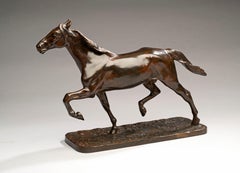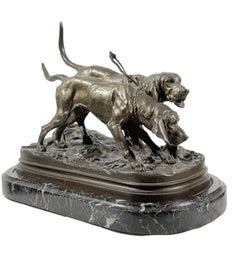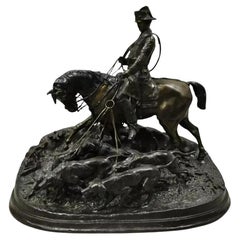Items Similar to Horse Playing with a Dog (The Good Companions) Pierre-Jules Mene (1810-1879)
Want more images or videos?
Request additional images or videos from the seller
1 of 14
Pierre Jules MêneHorse Playing with a Dog (The Good Companions) Pierre-Jules Mene (1810-1879)
$14,000
£10,855.18
€12,317.24
CA$20,068.40
A$21,821.53
CHF 11,497.81
MX$265,068.22
NOK 144,550.73
SEK 135,504.63
DKK 92,430.16
About the Item
Antique Horse Bronze
"Horse in the Stable Playing with a Dog (The Good Companions)"
Jument à l'écurie jouant avec un chien
Pierre-Jules Mene (French, 1810-1879)
Bronze
19 x 10 inches
One of Mene's most beloved bronze, well-loved early example with beautiful rich patina. A sensitive portrait of a horse nuzzling his companion while the terrier is giving kisses to the horse’s nose.
Cast by Mene’s own foundry and is very well detailed with a medium brown patina.
Pierre-Jules Mêne (1810-1879) was one of the most successful and prolific animalier sculptors of the 19th century, known for his naturalistic representation of animals.
Mêne received no formal education in sculpture but was taught to draw and model by his father and later began casting his own sculptures. He was largely self-taught, possessing a keen observation of nature that enabled him to capture the essence of his animal subjects with remarkable accuracy and vivacity.
His work debuted at the Paris Salon in 1838, and from that point onwards, he exhibited his sculptures regularly. Mêne specialized in small-scale domestic animals, his subjects often including horses, dogs, bulls, and sheep. Interestingly, almost no big game are found in Mêne's ouevre.
Beginning in 1837 as orders started coming in, Mêne worked as Antoine-Louis Barye before him, opening his own foundry where he personally oversaw the manufacture and production of his art. The work produced there bears the hallmark of extraordinary attention to detail and thoughtfulness shown in every element of presentation and assembly. His mastery in the technical aspects of casting bronze without relying on professional founders for the completion of his models gave him a significant advantage in producing his pieces with fine detail and at a lower cost. This operation was expanded in 1852 to handle the casting of models for his new son-in-law, Auguste Cain.
Mêne’s sculptures are characterized by their naturalistic detail and the sense of immediate and candid snapshots of the animals in their daily lives. The essence of these qualities is captured in the sculpture “The Good Companions” which would become one of his best-known sculpture and clearly was a cherished favorite demanded by his clients.
In the 1850s, Mêne's work gained international fame, and he started receiving commissions from patrons across Europe. His success was such that his sculptures were reproduced widely, in different sizes, and his foundry became one of the most prominent in Paris for animal bronzes. To this end, as an avenue into the profitable English market, he made arrangements with the Coalbrookdale foundry and the Falkirk foundry to cast some of his models.
Mêne’s artistic contributions were recognized with several awards during his lifetime. He was awarded first-class medals at the Expositions Universelles in Paris in 1855, 1861, and 1867, and he was made a Chevalier of the Legion of Honor in 1861.
Mêne's commitment to realism, at a time when the academic tradition still dominated art, was innovative and influential. He is often mentioned alongside artists like Antoine-Louis Barye and Auguste Caïn, who also contributed to the popularity of the animalier school in France.
After a prosperous career, Pierre-Jules Mêne died in Paris on May 20, 1879.
Today, the works of Mêne are held in numerous private collections and museums worldwide, including the Louvre and the Musée d'Orsay in Paris. In terms of reputation, he was second only to the great father of the Animaliers, Antoine-Louis Barye. Mêne remains celebrated for his contributions to French art and the animalier genre, and his sculptures are highly sought after by collectors for their beauty and lifelike quality.
- Creator:Pierre Jules Mêne (1810 - 1879, French)
- Dimensions:Height: 10 in (25.4 cm)Width: 19 in (48.26 cm)
- Medium:
- Movement & Style:
- Period:
- Condition:The bronze is in very good condition with a rich and lustrous patina.
- Gallery Location:SANTA FE, NM
- Reference Number:1stDibs: LU1408215223032
About the Seller
5.0
Gold Seller
Premium sellers maintaining a 4.3+ rating and 24-hour response times
Established in 1995
1stDibs seller since 2020
124 sales on 1stDibs
Typical response time: 1 hour
- ShippingRetrieving quote...Shipping from: Santa Fe, NM
- Return Policy
Authenticity Guarantee
In the unlikely event there’s an issue with an item’s authenticity, contact us within 1 year for a full refund. DetailsMoney-Back Guarantee
If your item is not as described, is damaged in transit, or does not arrive, contact us within 7 days for a full refund. Details24-Hour Cancellation
You have a 24-hour grace period in which to reconsider your purchase, with no questions asked.Vetted Professional Sellers
Our world-class sellers must adhere to strict standards for service and quality, maintaining the integrity of our listings.Price-Match Guarantee
If you find that a seller listed the same item for a lower price elsewhere, we’ll match it.Trusted Global Delivery
Our best-in-class carrier network provides specialized shipping options worldwide, including custom delivery.More From This Seller
View AllAntique Bronze Portrait Draft Horse by Isidore Jules Bonheur (France, 1827-1901)
By Isidore Jules Bonheur
Located in SANTA FE, NM
Antique Bronze Portrait of a Draft Horse
Isidore Jules Bonheur (France, 1827-1901)
Circa 1840s
Cast bronze mounted on a rectangular plinth atop a marble s...
Category
1870s Realist Figurative Sculptures
Materials
Bronze
Antique Horse Bronze Trotting Stallion Isidore Jules Bonheur (France, 1827-1901)
By Isidore Jules Bonheur
Located in SANTA FE, NM
Antique Horse Bronze
Portrait of a Trotting Stallion
Isidore Jules Bonheur (France, 1827-1901)
Cast bronze mounted on a rectangular plinth with dark brown patina,
Signed: I. BONHEUR
17 x 11 3/4
A brilliant exploration of a stallion in full trot. The patina is a deep, warm walnut brown with honey-colored tones.
Isidore Bonheur was best known and the most distinguished of the 19th century French animalier sculptors. Isidore, the younger brother of Rosa Bonheur and older brother of Auguste, began his studies of painting initially with his father, who was friends with Francisco Goya. By 1848 he debuted at the Paris Salon having discontinued animal and landscape painting to concentrate on creating sculptures and in 1849, Bonheur enrolled at the Ecole des Beaux Arts. He won medals at the Paris Salon in 1859 and did so again in 1865 and in 1869. After entering the Exposition Universelle 1855, he won the Gold Medal in 1889. In the 1870s exhibited in the London at the Royal Academy of Arts where he earned great prestige and won the coveted Medaille d’Or. After winning numerous other medals and prizes, Bonheur was awarded the Legion d' Honneur in 1895 and he was Knighted in Portugal, Spain and France. Bonheur continued exhibiting at the Paris Salon until 1899.
Many of his bronzes were fabricated at the foundry owned by Hippolyte Peyrol, Bonheur's brother-in-law by marriage to Isidore’s youngest sister Juliette Bonheur. The Peyrol casts for both Rosa and Isidore are exceptionally well executed which suggests a strong working relationship between the founder and sculptor. There is little doubt that Isidore Bonheur was an acute observer of nature; his animals were not anthropomorphized but modelled to catch movement or posture characteristics of the particular species he was sculpting. He achieved this most successfully with his sculptures of horses which are usually depicted as relaxed rather than spirited. These figures are among his most renowned works and his equestrian models became very popular, particularly among the British aristocracy.
An acute observer of nature, his sculptures reflect his commitment to the Realist school - with precise detailing of the movements of animals in their natural habitats. Ultimately, His naturalistic studies of animals are now some of the most highly sought after works by any of the animalier. He was possibly inspired by his many visits to the Buffalo Bill Wild West Show...
Category
1870s Realist Figurative Sculptures
Materials
Bronze
Antique Bronze Dog "Whippet with a Butterfly" Arthur Waagen (1833-1898) 2 of 2
By Arthur Waagen
Located in SANTA FE, NM
Antique Bronze Dog Portrait
“La Levrette au Papillon” or “Whippet (Greyhound) with a Butterfly”
Arthur Waagen (Germany, France 1833-1898)
Circa 1860’s
11 x 8 x 4 inches
(2of 2. No...
Category
1860s Academic Figurative Sculptures
Materials
Bronze
Antique Exceptional Bronze Draft Horse by Pierre Jules Mêne (French, 1810-1879)
Located in SANTA FE, NM
Antique Horse Bronze
Exceptional Bronze of a Draft Horse
Pierre Jules Mêne (French, 1810-1879)
Circa 1860s
4 3/4 (W) x 3.25 (H)
As Mêne personally ov...
Category
Mid-19th Century Romantic Figurative Sculptures
Materials
Bronze
Antique Bronze Dog "Whippet with a Butterfly" Arthur Waagen (1833-1898) 1 of 2
By Arthur Waagen
Located in SANTA FE, NM
Antique Bronze Dog Portrait
“La Levrette au Papillon” or “Whippet (Greyhound) with a Butterfly”
Arthur Waagen (Germany, France 1833-1898)
Circa 1860’s
11 x 8 x 4 inches
(1 of 2. ...
Category
1860s Academic Figurative Sculptures
Materials
Bronze
Antique 19th cent. Dog Portrait Jack Russell Terrier by Pierre-Albert Laplanche
Located in SANTA FE, NM
Antique Bronze Dog Portrait of a Terrier
Pierre-Albert Laplanche (French, 1826-1873)
Signed in script to base "Laplanche"
Stamped "E.V 3753"
8 x 2.75 x 8 1/4 inches
This is a super...
Category
Mid-19th Century Academic Figurative Sculptures
Materials
Bronze
You May Also Like
Horse training with its stable lad
Located in PARIS, FR
Horse training with its stable lad
by Arthur Marie Gabriel comte du Passage (1838-1909)
A bronze group with nuanced dark brown patina
Signed on the base " Cte du Passage "
Period ca...
Category
Late 19th Century French School Figurative Sculptures
Materials
Bronze
Alfred Dubucand (1828-1894): Two hunting dogs
Located in Berlin, DE
Dubucand Alfred 1828-1894
Two Hunting Dogs, Bronze on a Marble Base
The Bronze with the monogram 'E.V.' and the number '2958'
Two Hunting Dogs, Group Signed Alfred Dubucand, Fren...
Category
Late 19th Century Realist Figurative Sculptures
Materials
Bronze
P.J. Mene The Hunt Scene Large Bronze Sculpture Pierre Jules Statue Horse Dogs
By Pierre Jules Mêne
Located in Philadelphia, PA
P.J. Mene The Hunt Scene Large Bronze Sculpture Pierre Jules Statue Horse Dogs. Item featured is signed to base, "P.J. Mene 1869", artist Pierre Jules Mene, large impressive size, re...
Category
Antique Late 19th Century Unknown Other Figurative Sculptures
Materials
Bronze
Hippolyte Heizler, Iconic Bronze Sculpture of Two Dogs Chasing a Hare, 19th Cent
By Hippolyte Heizler
Located in Bochum, NRW
Hippolyte Heizler (1828–1871).
Two dogs standing in front of a hare hiding under the leaves.
Large bronze statuette with brown medal patina.
Molded oval ...
Category
Antique 1860s French Louis Philippe Animal Sculptures
Materials
Bronze
$8,230 Sale Price
20% Off
The Hunter and Hound
By Pierre Jules Mêne
Located in Missouri, MO
Pierre-Jules Mene
"The Hunter and Hound" (Le Valet de Limier) 1879
Bronze
approx. 19 x 8 x 14 inches
Signed
PIERRE JULES MENE (1810-1879)
Pierre...
Category
1870s Realist Figurative Sculptures
Materials
Bronze
Price Upon Request
Vimar Auguste (1851-1916)+bronze, Bohemian horse and monkeys
Located in Gent, VOV
Bohemian horse and monkeys
As early as 1900, Vimar started to create sculptures. His reputation as an illustrator and painter was at its peak.His sculp...
Category
Late 19th Century Naturalistic Figurative Sculptures
Materials
Bronze
More Ways To Browse
Antoine Louis Barye
Pierre Jules Mene Bronze Sculpture
Mene Bronze
Mene Bronze Sculpture
Pierre Jules Mene Bronze
Horses In Bronze
Animal Sculpture Dog Bronze Mene
Pierre Jule Mene Horse Sculptures
Pierre Jules Mene Bronze Horse
Mene Horse
Mene Bronze Horse
Kota Reliquary Figure
Lapin Bijou Sandoz
Leslie Hawk
Lincoln In Dalivision
Loro Blonyo
Luke Chueh
Marble Sculpture Nudes Small
